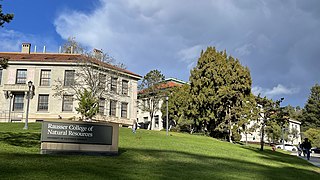
| Established | 2007 |
|---|---|
| Rector | Fortunat Joos |
| Location | |
| Website | www.oeschger.unibe.ch |
 | |
The Oeschger Centre for Climate and Climate Change Research (OCCR) is the interdisciplinary centre of excellence for climate research of the University of Bern.

| Established | 2007 |
|---|---|
| Rector | Fortunat Joos |
| Location | |
| Website | www.oeschger.unibe.ch |
 | |
The Oeschger Centre for Climate and Climate Change Research (OCCR) is the interdisciplinary centre of excellence for climate research of the University of Bern.

The centre was established in 2007 and was named after Hans Oeschger (1927-1998), a pioneer of modern climate research, who worked in Bern. The OCCR brings together researchers from nine institutes and four faculties. It has more than 200 members working in 26 research groups. The OCCR is at the forefront of international research in a number of different fields. Researchers from the University of Bern have participated as co-chair, coordinating lead authors or lead authors in all the assessment reports so far published by the IPCC. [1] Many of them are still working today at the OCCR. In addition to research within disciplines, the OCCR puts special emphasis on interdisciplinary projects. [2] Regionally rooted and globally linked, the OCCR hopes to find ways to meet the challenge of global climate change at many different levels through the collaboration of experts in the natural, human and social sciences, in economics and law. The OCCR is active not only in research; it is also involved in teaching and runs the Graduate School of Climate Sciences.
The Oeschger Centre (OCCR) conducts research on the one hand into the long-term development and dynamics of the climate system and the climate of the present and the future. On the other hand, it investigates the impact of climate change on important land ecosystems as well as on the economy and society. In particular it works on strategies to adapt to the changing climate and to slow down climate change. At the centre of the OCCR's research is the climate system and its interaction with society and the economy.
Specific areas of research include:
The Oeschger Centre uses models of varying kinds and complexity, and also takes measurements and carries out reconstructions of important climate variables (e.g. natural and man-made radiative forcing).
The Oeschger Centre runs the University of Bern's Graduate School of Climate Sciences [3] and offers academic training to MSc and PhD level. For the specialist "MSc in Climate Sciences" [4] (120 ECTS), applicants have to pass through a selection process. Students put together their own curriculum by selecting courses from a range of topics offered by several different faculties. The selection can lead to any one of five specialisations. The OCCR's main areas of research are reflected in the curriculum of the courses offered by the Graduate School of Climate Sciences.
The Oeschger Centre has a decidedly international outlook in its teaching, and works closely with the Swiss Federal Institute of Technology in Zürich. More than a third of its students come from abroad, and all teaching is conducted in English. The PhD programme is strongly research-orientated, and lasts for three to four years. Students with a degree from the Graduate School of Climate Sciences may take up academic careers, work in the private sector – for example in banks or in insurance – or in the environmental sector for the government or with non-governmental organisations.
The Oeschger Centre for Climate Research (OCCR) is an interdisciplinary centre at the University of Bern, made up of research groups from the participating institutes. Administratively it is part of the Faculty of Science. The OCCR received its mandate from the university's governing body. [5] The president, director and a scientific committee made up of representatives of the participating faculties and institutes are responsible for the strategic management of the OCCR. The OCCR is run by a management centre which encourages collaboration between the research groups, provides services for the researchers and publicises the work of the OCCR.
The Oeschger Centre includes the following research groups:

Physical geography is one of the three main branches of geography. Physical geography is the branch of natural science which deals with the processes and patterns in the natural environment such as the atmosphere, hydrosphere, biosphere, and geosphere. This focus is in contrast with the branch of human geography, which focuses on the built environment, and technical geography, which focuses on using, studying, and creating tools to obtain, analyze, interpret, and understand spatial information. The three branches have significant overlap, however.

The University of Akureyri was founded in 1987 in the town of Akureyri in the northeastern part of Iceland. It is today a school of health sciences, humanities and social science, and a school of business and science. Over 2000 students attended the university in the autumn semester of 2014, around half of them through flexible learning, making the university the largest provider of distance education in the country. The University of Akureyri coordinates with other Icelandic Universities to operate the University Centre of the Westfjords located in Ísafjörður, which operates two master's degrees, one in Coastal and Marine Management and the other in Marine Innovation. Additionally, The University of Akureyri coordinates with other Nordic Universities for the West Nordic Studies and Polar Law Masters programs.
Hans Oeschger was a Swiss climatologist. He founded the Division of Climate and Environmental Physics at the Physics Institute of the University of Bern in 1963 and was the director until his retirement in 1992.

Heinrich Heine University Düsseldorf, named after German poet Heinrich Heine, is a public university in North Rhine-Westphalia, Germany, which was founded in 1965. It is the successor organization to Düsseldorf's Medical Academy of 1907.

Cochin University of Science and Technology (CUSAT) is a state government-owned autonomous university in Kochi, Kerala, India. It was founded in 1971 and has three campuses: two in Kochi and one in Kuttanad, Alappuzha, 66 km (41 mi) inland.

The University of Bern is a public research university in the Swiss capital of Bern. It was founded in 1834. It is regulated and financed by the Canton of Bern. It is a comprehensive university offering a broad choice of courses and programs in eight faculties and some 150 institutes. With around 19,000 students, the University of Bern is the third largest university in Switzerland.

The Carl von Ossietzky University of Oldenburg is a university located in Oldenburg, Germany. It is one of the most important and highly regarded educational facilities in northwestern Germany and specialises in interdisciplinary and sustainable development studies and renewable energy studies with focus on solar and wind energy.
The Earth Institute is a research institute at Columbia University created in 1995 for addressing complex issues facing the planet and its inhabitants, with a focus on sustainable development. With an interdisciplinary approach, this includes research in climate change, geology, global health, economics, management, agriculture, ecosystems, urbanization, energy, hazards, and water. The Earth Institute's activities are guided by the idea that science and technological tools that already exist could be applied to greatly improve conditions for the world's poor, while preserving the natural systems that support life on Earth.
Raymond S. Bradley is a climatologist and University Distinguished Professor in the Department of Geosciences at the University of Massachusetts Amherst, where he is also research director of the Climate System Research Center. Bradley's work indicates that the warming of Earth's climate system in the twentieth century is inexplicable via natural mechanisms.

The Rausser College of Natural Resources (RCNR), or Rausser College, is the oldest college at the University of California, Berkeley and in the University of California system. Established in 1868 as the College of Agriculture under the federal Morrill Land-Grant Acts, CNR is the first state-run agricultural experiment station. The college is home to four internationally top-ranked academic departments: Agriculture and Resource Economics; Environmental Science, Policy, and Management; Nutritional Sciences and Toxicology; and Plant and Microbial Biology, and one interdisciplinary program, Energy and Resources Group. Since February 2020, it is named after former dean and distinguished professor emeritus Gordon Rausser after his landmark $50 million naming gift to the college.

The Centre for Research in the Arts, Social Sciences and Humanities (CRASSH) is an interdisciplinary research centre within the University of Cambridge. Founded in 2001, CRASSH came into being as a way to create interdisciplinary dialogue across the University’s many faculties and departments in the arts, social sciences, and humanities, as well as to build bridges with scientific subjects. It has now grown into one of the largest humanities institutes in the world and is a major presence in academic life in the UK. It serves at once to draw together disciplinary perspectives in Cambridge and to disseminate new ideas to audiences across Europe and beyond.

Science Policy Research Unit (SPRU) is a research centre based at University of Sussex in Falmer, near Brighton, UK. It focuses on long term transformative change, science policy and innovation across different sectors, societies and structures. It was one of the first interdisciplinary research centres in the field of science and technology policy and at the forefront of the development of innovation as an academic discipline. Alongside internationally renowned research, SPRU also offers a range of MSc courses, as well as PhD research degrees.

Earth system science (ESS) is the application of systems science to the Earth. In particular, it considers interactions and 'feedbacks', through material and energy fluxes, between the Earth's sub-systems' cycles, processes and "spheres"—atmosphere, hydrosphere, cryosphere, geosphere, pedosphere, lithosphere, biosphere, and even the magnetosphere—as well as the impact of human societies on these components. At its broadest scale, Earth system science brings together researchers across both the natural and social sciences, from fields including ecology, economics, geography, geology, glaciology, meteorology, oceanography, climatology, paleontology, sociology, and space science. Like the broader subject of systems science, Earth system science assumes a holistic view of the dynamic interaction between the Earth's spheres and their many constituent subsystems fluxes and processes, the resulting spatial organization and time evolution of these systems, and their variability, stability and instability. Subsets of Earth System science include systems geology and systems ecology, and many aspects of Earth System science are fundamental to the subjects of physical geography and climate science.
Migration studies is the academic study of human migration. Migration studies is an interdisciplinary field which draws on anthropology, prehistory, history, economics, law, sociology and postcolonial studies.

Lindsay C. Stringer is a Professor in Environment and Development at the University of York.

The contributions of women in climate change have received increasing attention in the early 21st century. Feedback from women and the issues faced by women have been described as "imperative" by the United Nations and "critical" by the Population Reference Bureau. A report by the World Health Organization concluded that incorporating gender-based analysis would "provide more effective climate change mitigation and adaptation."

The World Trade Institute (WTI) is an interdisciplinary centre at the University of Bern focused on research, education, and policy support in the areas of global economic governance, international economic law, and international economic sustainability.

Christian Pfister is a Swiss historian.
The Centre for Development and Environment (CDE) is an interdisciplinary research centre specializing in sustainability science and land systems at the University of Bern, Switzerland. It conducts research in many countries worldwide, with a particular focus on the Eastern Africa, Southeast Asia, South America, Europe, and Switzerland. In terms of teaching, CDE offers courses in the field of sustainable development at the bachelor’s, master’s, doctoral, and postdoctoral level.

Heinz Wanner is a Swiss geographer and climate researcher. He is a professor emeritus and works at the Oeschger Centre for Climate Change Research of the University of Bern.